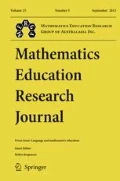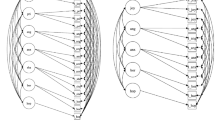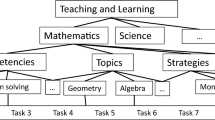Abstract
Studies in mathematics education have shown interactions between a variety of emotions and the quality of learning. Research has found that positive emotions are among the main factors that engender a sense of well-being. In the current study, we focused on emotions that may be aroused while coping with mathematical challenges, and sought to evaluate their intensity and frequency in that context. The research was conducted among a unique group: competitors of the Israel International Math Competition for Girls (IIMCG), a competition involving problem solving in mathematical thinking, which targets female high school students. The participants were 403 of the competitors (304 Israeli, 99 American) who had reached the second round of the competition. The research instrument was a Math Emotions Measuring Instrument, which assesses positive and negative emotions expressed while coping with mathematical challenges. Results emphasized the numerical prominence of positive as opposed to negative emotions that were reported by participants. The ratio of positive to negative emotions (i.e., the positivity ratio) was high – 4.2:1. In addition, a statistically significant cultural difference was found between the participants from Israel and those from the USA in terms of the intensity of 10 out of 28 emotions experienced. Our findings shed new light on the connection between mathematics and emotions and prove the importance of generating strategies to enhance a positive climate in teaching and learning mathematics.

Similar content being viewed by others
References
Attard, C., Ingram, N., Forgasz, H., Leder, G., & Grootenboer, P. (2016). Mathematics education and the affective domain. In K. Makar, S. Dole, J. Visnovska, M. Goos, A. Bennison, & K. Fry (Eds.), Research in mathematics education in Australasia 2012–2015 (pp. 73–96). Dordrecht: Springer.
Bagozzi, R. P., Wong, N., & Yi, Y. (1999). The role of culture and gender in the relationship between positive and negative affect. Cognition and Emotion, 13(6), 641–672.
Barbeau, E., & Taylor, P. (Eds.). (2009). Challenges beyond the classroom: the 16th ICMI study. New York: Springer.
Biller, J. (1996). Reduction of mathematics anxiety. Paper presented at the Annual National Conference on Liberal Arts and Education of Artists, http://www.eric.ed.gov/ERICDocs/data/ericdocs2sql/content_storage_01/0000019b/80/16/71/9f.pdf
Boiger, M., Ceulemans, E., De Leersnyder, J., Uchida, Y., Norasakkunkit, V., & Mesquita, B. (2018). Beyond essentialism: cultural differences in emotions revisited. Emotion, 18(8), 1142–1162.
Brislin, R. W. (1970). Back-translation for cross-cultural research. Journal of Cross-Cultural Psychology, 1(3), 185–216.
Brown, N. J., Sokal, A. D., & Friedman, H. L. (2013). The complex dynamics of wishful thinking: the critical positivity ratio. American Psychologist, 68(9), 801–813.
Carmona-Halty, M., Salanova, M., Llorens, S., & Schaufeli, W. B. (2019). How psychological capital mediates between study-related positive emotions and academic performance. Journal of Happiness Studies, 20(2), 605–617.
Chamberlin, S. A. (2010). A review of instruments created to assess affect in mathematics. Journal of Mathematics Education, 3(1), 167–182.
Chamberlin, S. A. (2019). The construct of affect in mathematical modeling. In S. A. Chamberlin & B. Sriraman (Eds.), Affect in mathematical modeling: advances in mathematics education (pp. 15–28). Cham: Springer.
Cobb, P., Yackel, E., & Wood, T. (1989). Young children’s emotional acts during mathematical problem solving. In D. B. McLeod & V. M. Adams (Eds.), Affect and mathematical problem solving: a new perspective (pp. 117–148). New York: Springer-Verlag.
Cohn, A. M., & Fredrickson, B. L. (2006). Beyond the moment, beyond the self: shared ground between selective investment theory and the broaden-and-build theory of positive emotions. Psychological Inquiry, 17(1), 39–44.
Cooke, A., Kavussanu, M., McIntyre, D., & Ring, C. (2013). The effects of individual and team competitions on performance, emotions, and effort. Journal of Sport & Exercise Psychology, 35, 132–143.
Credé, M., Tynan, M. C., & Harms, P. D. (2017). Much ado about grit: a meta-analytic synthesis of the grit literature. Journal of Personality and Social Psychology, 113(3), 492–511.
DeBellis, V. A., & Goldin, G. A. (2006). Affect and meta-affect in mathematical problem solving: a representational perspective. Educational Studies in Mathematics, 63, 131–147.
Diener, E., Sandvik, E., & Pavot, W. (1991). Happiness is the frequency, not the intensity, of positive versus negative affect. In F. Strack (Ed.), Subjective well-being: an interdisciplinary perspective (pp. 119–139). Oxford: Pergamon Press.
D’Mello, S. K., Lehman, B., Pekrun, R., & Graesser, A. C. (2014). Confusion can be beneficial for learning. Learning and Instruction, 29, 153–170.
Duckworth, A. L., & Gross, J. J. (2014). Self-control and grit: related but separable determinants of success. Current Directions in Psychological Science, 23(5), 319–325.
Duckworth, A. L., Peterson, C., Matthews, M. D., & Kelly, D. R. (2007). Grit: perseverance and passion for long-term goals. Journal of Personality and Social Psychology, 92(6), 1087–1101.
Durksen, T. L., Way, J., Bobis, J., Anderson, J., Skilling, K., & Martin, A. J. (2017). Motivation and engagement in mathematics: a qualitative framework for teacher-student interactions. Mathematics Education Research Journal, 29(2), 163–181.
Eid, M., & Diener, E. (2001). Norms for experiencing emotions in different cultures: inter-and intranational differences. Journal of Personality and Social Psychology, 81(5), 869–885.
Ekman, P. (1992). An argument for basic emotions. Cognition and Emotion, 6(3–4), 169–200.
Feldman Barrett, L., & Russell, J. A. (1998). Independence and bipolarity in the structure of current affect. Journal of Personality and Social Psychology, 74(4), 967–984.
Fredrickson, B. L. (2001). The role of positive emotions in positive psychology: the broaden-and-build theory of positive emotions. American Psychologist, 56(3), 218–226.
Fredrickson, B. L. (2013). Updated thinking on positivity ratios. American Psychologist, 68, 814–822.
Fredrickson, B. L., & Branigan, C. (2005). Positive emotions broaden the scope of attention and thought-action repertoires. Cognition and Emotion, 19, 313–332.
Frenzel, A. C., Becker-Kurz, B., Pekrun, R., Goetz, T., & Lüdtke, O. (2018). Emotion transmission in the classroom revisited: a reciprocal effects model of teacher and student enjoyment. Journal of Educational Psychology, 110(5), 609–628.
Frenzel, A. C., Pekrun, R., & Goetz, T. (2007). Girls and mathematics—a “hopeless” issue? A control-value approach to gender differences in emotions towards mathematics. European Journal of Psychology of Education, 22(4), 497–514.
Forgas, J. P. (2000). Feeling and thinking: summary and integration. In J. P. Forgas (Ed.), Feeling and thinking: the role of affect in social cognition (pp. 387–406). Cambridge: Cambridge University press.
Fried, L., Mansfield, C., & Dobozy, E. (2015). Teacher emotion research: introducing a conceptual model to guide future research. Issues in Educational Research, 25(4), 415–441.
Goetz, T., Frenzel, A. C., Hall, N. C., & Pekrun, R. (2008). Antecedents of academic emotions: testing the internal/external frame of reference model for academic enjoyment. Contemporary Educational Psychology, 33, 9–33.
Goldin, G. A. (2002). Affect, meta-affect, and mathematical belief structures. In G. C. Leder, E. Pehkonen, & G. Törner (Eds.), Beliefs: a hidden variable in mathematics education? (pp. 59–72). Dordrecht: Kluwer.
Goldin, G. A., Hannula, M. S., Heyd-Metzuyanim, E., Jansen, A., Kaasila, R., Lutovac, S., et al. (2016). Attitudes, beliefs, motivation and identity in mathematics education: an overview of the field and future directions. Cham: Springer.
Greensfeld, H., & Deutsch, Z. (2016). The centrality of positive emotions in the field of mathematics. Athens Journal of Education, 3(4), 345–364.
Grootenboer, P., & Hemmings, B. (2007). Mathematics performance and the role played by affective and background factors. Mathematics Education Research Journal, 19(3), 3–20.
Grootenboer, P., & Marshman, M. (2016). Mathematics, affect and learning: middle school students’ beliefs and attitudes about mathematics education. Singapore: Springer.
Han, S., Liou-Mark, J., Yu, K. T., & Zeng, S. (2015). Self-efficacy and attitudes towards mathematics of undergraduates: a US and Taiwan comparison. Journal of Mathematics Education, 8(1), 1–15.
Hannula, M. S. (2006). Motivation in mathematics: goals reflected in emotions. Educational Studies in Mathematics, 63, 165–178.
Hannula, M. S. (2012). Exploring new dimensions of mathematics-related affect: embodied and social theories. Research in Mathematics Education, 14(2), 137–161.
Hannula, M. S. (2019). Young learners’ mathematics-related affect: a commentary on concepts, methods, and developmental trends. Educational Studies in Mathematics, 100(3), 309–316.
Hannula, M. S. (2020). Affect in mathematics education. In S. Lerman (Ed.), Encyclopedia of mathematics education (2nd ed.). Cham: Springer (in press).
Hannula, M. S., Pantziara, M., & Di Martino, P. (2018). Affect and mathematical thinking: exploring developments, trends, and future directions. In T. Dreyfus, M. Artigue, D. Potari, S. Prediger, & K. Ruthven (Eds.), Developing research in mathematics education: twenty years of communication, cooperation and collaboration in Europe (pp. 128–141). London: Routledge.
Ingram, N., Holmes, M., Linsell, C., Livy, S., McCormick, M., & Sullivan, P. (2020). Exploring an innovative approach to teaching mathematics through the use of challenging tasks: a New Zealand perspective. Mathematics Education Research Journal. (in press).https://doi.org/10.1007/s13394-019-00266-1
Jorgensen, R., & Larkin, K. (2017). Analysing the relationships between students and mathematics: a tale of two paradigms. Mathematics Education Research Journal, 29(1), 113–130.
Kahneman, D. (1999). Objective happiness. In D. Kahneman, E. Diener, & N. Schwarz (Eds.), Well-being: the foundations of hedonic psychology (pp. 3–25). New York: Russell Sage Foundation.
Lazarus, R. S. (1991). Emotion and adaptation. Oxford: Oxford University Press.
Lazarus, R. S. (2000). How emotions influence performance in competitive sports. The Sport Psychologist, 14, 229–252.
Leder, G., & Grootenboer, P. (2005). Affect and mathematics education. Mathematics Education Research Journal, 17(2), 1–8.
Leikin, R., & Pitta-Pantazim, D. (2013). Creativity and mathematics education: the state of the art. ZDM, 45(4), 159–166.
Lichtenfeld, S., Pekrun, R., Stupnisky, R. H., Reiss, K., & Murayama, K. (2012). Measuring students’ emotions in the early years: the achievement emotions questionnaire-elementary school (AEQ-ES). Learning and Individual Differences, 22(2), 190–201.
Ma, X. (1999). A meta-analysis of the relationship between anxiety and toward mathematics and achievement in mathematics. Journal for Research in Mathematics Education, 30, 502–540.
Mandler, G. (1989). Affect and learning: causes and consequences of emotional interactions. In D. B. McLeod & V. M. Adams (Eds.), Affect and mathematical problem solving: a new perspective (pp. 3–19). New York: Springer-Verlag.
Martinent, G., Campo, M., & Ferrand, C. (2012). A descriptive study of emotional process during competition: nature, frequency, direction, duration and co-occurrence of discrete emotions. Psychology of Sport and Exercise, 13, 142–151.
Matsumoto, D., Yoo, S. H., & Fontaine, J. (2008). Mapping expressive differences around the world the relationship between emotional display rules and individualism versus collectivism. Journal of Cross-Cultural Psychology, 39(1), 55–74.
McDonough, A., & Sullivan, P. (2014). Seeking insights into young children’s beliefs about mathematics and learning. Educational Studies in Mathematics, 87(3), 279–296.
McLeod, D. B. (1992). Research on affect in mathematics education: a reconceptualization. In D. A. Grouws (Ed.), Handbook of research on mathematics teaching and learning (pp. 575–596). New York: Macmillan.
Mesquita, B., De Leersnyder, J., & Boiger, M. (2016). The cultural psychology of emotion. In L. Feldmann Barrett, M. Lewis, & J. M. Haviland-Jones (Eds.), Handbook of emotions (4th ed., pp. 393–411). New York: The Guilford Press.
Mesquita, B., & Ellsworth, P. (2001). The role of culture in appraisal. In K. R. Scherer, A. Schorr, & T. Johnstone (Eds.), Appraisal processes in emotion: theory, methods, research (pp. 233–248). New York: Oxford University Press.
Mesquita, B., & Frijda, N. H. (1992). Cultural variations in emotions: a review. Psychological Bulletin, 112, 179–204.
Middleton, J., Jansen, A., & Goldin, G. A. (2017). The complexities of mathematical engagement: motivation, affect, and social interactions. In J. Cai (Ed.), Compendium for research in mathematics education (pp. 667–699). Reston: National Council of Teachers of Mathematics.
Moen, F., Vitsøe, J., Rasdal, V., Myhre, K., Sandbakk, Ø., & Moen, F. (2017). The role of emotions for 4 athletes in nordic combined in ski jumping competitions in world cup. The Sport Journal, 20. Retrieved from http://thesportjournal.org/article/the-role-of-emotions-for-4-athletes-in-nordic-combined-in-ski-jjumping-competitions-in-world-cup/
Muñoz-Merino, P. J., Molina, M. F., Muñoz-Organero, M., & Kloos, C. D. (2014). Motivation and emotions in competition systems for education: an empirical study. IEEE Transactions on Education, 57(3), 182–187.
Niederle, M., & Vesterlun, L. (2011). Gender and competition. Annual Review of Economics, 3, 601–630.
Pavlov, D., Kelevedjiev, E., & Tabov, J. (2008). Risk-taking behavior in math competitions. Mathematics Competitions, 21(2), 45–60.
Peixoto, F., Sanches, C., Mata, L., & Monteiro, V. (2017). How do you feel about math?: relationships between competence and value appraisals, achievement emotions and academic achievement. European Journal of Psychology of Education, 32(3), 385–405.
Pekrun, R. (2019). The murky distinction between curiosity and interest: state of the art and future prospects. Educational Psychology Review, 31(4), 905–914.
Pekrun, R., Goetz, T., Titz, W., & Perry, R. (2002). Academic emotions in students’ self-regulated learning and achievement: a program of qualitative and quantitative research. Educational Psychologist, 37(2), 91–105.
Pekrun, R., & Linnenbrink-Garcia, L. (2014). Introduction to emotions in education. In R. Pekrun & L. Linnenbrink-Garcia (Eds.), International handbook of emotions in education (pp. 1–10). New York: Taylor & Francis.
Pekrun, R., & Stephens, E. J. (2012). Academic emotions. In K. R. Harris, S. Graham, T. Urdan, J. M. Royer, & M. Zeidner (Eds.), APA educational psychology handbook (Vol. 2, pp. 3–31). Washington, DC: American Psychological Association.
Plenty, S., & Heubeck, B. G. (2013). A multidimensional analysis of changes in mathematics motivation and engagement during high school. Educational Psychology, 33(1), 14–30.
Russo, J., & Hopkins, S. (2017). Student reflections on learning with challenging tasks: ‘I think the worksheets were just for practice, and the challenges were for maths’. Mathematics Education Research Journal, 29(3), 283–311.
Ryan, R., & Deci, E. (2000). Intrinsic and extrinsic motivations: classic definitions and new directions. Contemporary Educational Psychology, 25(1), 54–67.
Scherer, K. R. (1997). The role of culture in emotion-antecedent appraisal. Journal of Personality and Social Psychology, 73, 902–922.
Schoenfeld, A. H. (1992). Learning to think mathematically: problem solving, metacognition, and sense making in mathematics. In D. A. Grouws (Ed.), Handbook of research on mathematics teaching and learning (pp. 334–370). New York: McMillan.
Schukajlow, S., Rakoczy, K., & Pekrun, R. (2017). Emotions and motivation in mathematics education: theoretical considerations and empirical contributions. ZDM, 49(3), 307–322.
Schweinle, A., Meyer, D. K., & Turner, J. C. (2006). Striking the right balance: students’ motivation and affect in elementary mathematics. The Journal of Educational Research, 99(5), 271–294.
Shuman, V., & Scherer, K. R. (2014). Concepts and structures of emotions. In R. Pekrun & L. Linnenbrink-Garcia (Eds.), International handbook of emotions in education (pp. 13–35). New York: Taylor & Francis.
Silver, E. A. (1997). Fostering creativity through instruction rich in mathematical problem solving and problem posing. ZDM, 3, 75–80.
Smith, M. S., & Stein, M. K. (2011). Five practices for orchestrating productive mathematics discussions. Reston: National Council of Teacher of Mathematics.
Spielberger, C. D. (1972). Anxiety: current trends in theory and research (Vol 1). New York: Academic Press.
Sullivan, P., Askew, M., Cheeseman, J., Clarke, D., Mornane, A., Roche, A., & Walker, N. (2015). Supporting teachers in structuring mathematics lessons involving challenging tasks. Journal of Mathematics Teacher Education, 18(2), 123–140.
Taylor, P. (2009). WFNMC 25 years on: some experiences. Mathematics Competitions, 22(1), 10–18.
Tirri, K., & Campbell, J. (2002). Actualizing mathematical giftedness in adulthood. Educating Able Children, 6(1), 14–20.
Triandis, H. (1997). Cross-cultural perspectives on personality. In R. Hogan, J. Johnson, & S. R. Briggs (Eds.), Handbook of personality psychology (pp. 439–464). San Diego: Academic Press.
Tugade, M., & Fredrickson, B. L. (2007). Regulation of positive emotions: emotion regulation strategies that promote resilience. Journal of Happiness Studies, 8(3), 311–333.
Watson, D., Clark, L. A., & Tellegen, A. (1988). Development and validation of brief measures of positive and negative affect: the PANAS scale. Journal of Personality and Social Psychology, 54, 1063–1070.
Weiner, B. (1985). An attributional theory of achievement motivation and emotion. Psychological Review, 92(4), 548–573.
Wikipedia (n.d). List of math competitions. Retrieved from http://en.wikipedia.org/wiki/List_of_mathematics_competitions
Acknowledgments
We thank all the competitors of the Israel International Math Competition for Girls (IIMCG) who participated in our study.
Funding
This research did not receive any specific grant from funding agencies in the public, commercial, or not-for-profit sectors.
Author information
Authors and Affiliations
Corresponding author
Ethics declarations
Conflict of interest
There is no financial/personal interest or belief that could affect our objectivity and there is no conflict of interest exist.
Additional information
Publisher’s note
Springer Nature remains neutral with regard to jurisdictional claims in published maps and institutional affiliations.
Rights and permissions
About this article
Cite this article
Greensfeld, H., Deutsch, Z. Mathematical challenges and the positive emotions they engender. Math Ed Res J 34, 15–36 (2022). https://doi.org/10.1007/s13394-020-00330-1
Received:
Revised:
Accepted:
Published:
Issue Date:
DOI: https://doi.org/10.1007/s13394-020-00330-1




